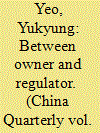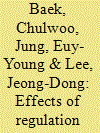|
|
|
Sort Order |
|
|
|
Items / Page
|
|
|
|
|
|
|
| Srl | Item |
| 1 |
ID:
093237


|
|
|
|
|
| Publication |
2009.
|
| Summary/Abstract |
This study explains the institutional structure and mechanism of economic regulation in China's telecommunications basic service industry. The case of telecoms basic service provides an excellent window to explore how Chinese leadership governs strategic state sectors whose assets and profits are central to the national economy. Challenging the ideational model of independent regulator, this study argues that the State-owned Assets Supervision and Administration Commission (SASAC) explains much of the telecoms business regulation, as the authority of the Ministry of Information Industry has been circumscribed by other party-state institutions. The SASAC's regulatory power suggests that the primary goal of the Chinese industrial economy is the best protection of state assets through the creation of large and strong state firms, not the protection of consumers' interests by breaking up the monopoly in markets.
|
|
|
|
|
|
|
|
|
|
|
|
|
|
|
|
| 2 |
ID:
179776


|
|
|
|
|
| Summary/Abstract |
The literature on the allocation of power for rule-making and law enforcement assumes that administrative agencies are ex-ante regulators, while courts are ex-post enforcers. However, the Supreme People’s Court of China makes proactive rules to govern economic affairs, functioning as a de facto market regulator. The empirical evidence on Chinese credit regulations suggests that the incentive level and information access interactively determine the rule-making power allocation between courts and agencies. This article argues that the additional delegation of proactive rule-making power to the judiciary is both a challenge and an opportunity for advancing China’s reform agenda. It proposes institutional rearrangements to correct ineffective incentives and to channel information into courts. The research highlights the hybrid role the Supreme People’s Court plays in policy implementation and dispute resolution, offering new insights into the design of efficient rule-making power allocation.
|
|
|
|
|
|
|
|
|
|
|
|
|
|
|
|
| 3 |
ID:
132603


|
|
|
|
|
| Publication |
2014.
|
| Summary/Abstract |
We propose a competitiveness index for the electricity industry based on efficiency, stability, and growth factors identified from previous studies subject to data accessibility. These are then weighted appropriately through the application of the analytical hierarchy process. This index is an alternative tool to capture the diverse characteristics of the electricity industry in order to analyze performance after deregulation. Using the competitiveness index, we analyze the effect of regulation change in specific economic environments represented by the level of economic development, energy intensity, and manufacturing share, for example. According to the results, deregulation generally increases competitiveness, but the effect depends on the economic environment and the type of regulation. Deregulating entry and vertical integration to increase competitiveness is more effective in countries where the level of economic development, energy intensity, and manufacturing share are low. The manner in which the privatization effect is related to the economic environment is, however, unclear.
|
|
|
|
|
|
|
|
|
|
|
|
|
|
|
|
| 4 |
ID:
096079


|
|
|
|
|
| Publication |
2010.
|
| Summary/Abstract |
The UK Government has committed itself to reducing its carbon dioxide emissions. The challenge of successfully achieving a transition to a sustainable energy system, in the context of the UK's largely privately owned energy industry, rests on the ability of policy makers to encourage and enable the necessary changes or innovation at all levels of the energy system. This paper argues that the UK's current, dominant political paradigm or framework (the regulatory state paradigm (RSP)) and within it, the role of the economic regulator, Ofgem acts as a fundamental block to this challenge.
The current economic regulatory system is based on trust in the market, or on predicted (albeit theoretical) known outcomes. To expand our regulatory system to one which can deliver a sustainable energy system requires innovation in a certain direction (as opposed to any innovation). That is the antithesis of the current process of regulation. Trust is required that Ofgem, the economic regulator, will develop rules and incentives which deliver an agreed sustainable energy goal, which is 'trusted' to be the 'right' goal. This requires Ofgem moving away from ex-ante regulation to a type of regulation where all costs, benefits and outcomes cannot be known beforehand and where they cannot necessarily be quantifiable. This has, very provisionally, been called Public Value Regulation (PVR).
|
|
|
|
|
|
|
|
|
|
|
|
|
|
|
|
|
|
|
|
|